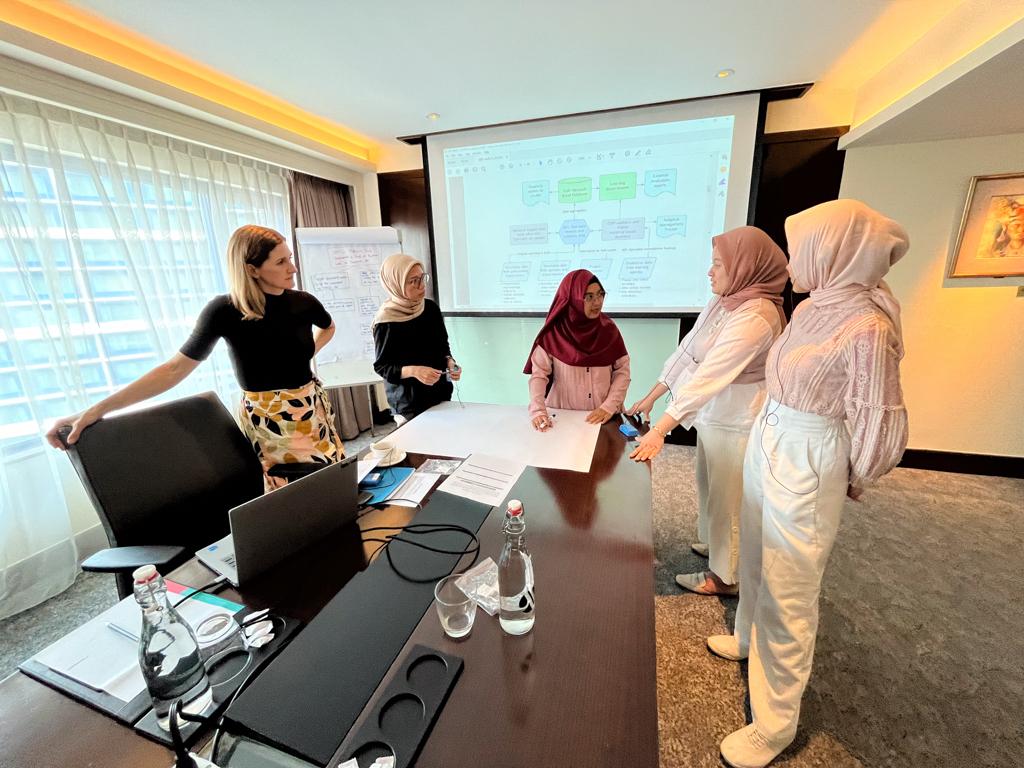CHISU Y3 Annual Report
This report covers our third year of implementation, from October 2022–September 2023.
The Country Health Information Systems and Data Use (CHISU) program strengthens country capacity and leadership to manage and use health information systems (HIS) and data to make evidence-based decisions.
The CHISU consortium is led by JSI Research & Training Institute, Inc. (JSI), with partners RTI International, Vital Strategies, Macro-Eyes, Jembi Health Systems, and Global Evaluation and Monitoring Network for Health (GEMNet Health).

Overview of Achievements

CHISU partners with countries to overcome complex challenges to HIS evolution. The United States Agency for International Development (USAID) created CHISU to work across multiple health areas with an integrated approach to strengthening health systems.
We envision country health systems in which stakeholders at every level—particularly health workers—can access high-quality data generated from multiple, interoperable data sources, and are able to use those data to guide policy, improve resource allocation, service delivery, and system performance.
We have experienced remarkable growth over the past year, expanding from nine countries and regions at the beginning of the year to 17 at the end of the year. We also expanded our global technical activities from 10 to 26—which contributes to our HIS leadership and helps build an evidence base for HIS strengthening.
Strategic Objective 1
HIS Governance
CHISU supported HIS governance and enabling environment initiatives to ensure coordinated, country-led health information systems strengthening efforts. We continued to serve in global HIS leadership roles to share thought leadership and coordinate with HIS partners. In several countries, we supported assessments to understand the status of each country’s HIS and its stakeholders’ capacity. We also supported HIS coordination bodies and promoted data standardization through guidelines, policies, and regulations.
S01 Interventions by SOCI Subcomponent in FY23, n = 50
Strategic Objective 2
Systems and Software
This year, CHISU’s activities to strengthen systems and software grew in number and scope. To build, strengthen, and sustain capacity of country staff, we conducted and supported training on different systems at different levels of each country’s health system. We continued to advocate for an approach to interoperability based on internationally recognized standards.
SO2 Interventions by SOCI Component in FY23, n = 75
Strategic Objective 3
Data Quality and Use
CHISU has continued to strengthen data use in countries by developing methods to assess needs. We also supported activities that highlight the strategic use of data.
SO3 Interventions by SOCI Subcomponent in FY23, n = 98
Strategic Objective 4
Local Organization Capacity Enhancement
CHISU continued building sustainable models for HIS technical support by discussing the establishment of an HIS Technical Support Facility in the Caribbean during planning meetings with the University of the West Indies. The program also initiated training and mentoring activities on monitoring, evaluation, and learning in Indonesia.

Cross-cutting Areas
Gender
CHISU continued to integrate gender considerations across our work. Notably, for the first time in FY 23, we began gender integration work under Strategic Objective 4. The number of gender considerations across activities increased from 66 reported last year to 105 reported in FY 23. We are also developing a framework to track and measure potential progression in gender and HIS outcomes based on the gender considerations being implemented in each country.
Data Security
Across CHISU country programs, we deliberately focus on data security and privacy—and there is an urgent need for this given the expansion of digital health information systems. To ensure that data security and privacy are further strengthened and advocated for in all other countries, we are developing a data security and privacy assessment tool. Results will inform relevant and country-focused interventions, and we hope to ensure that basic standards on data security and privacy are in place in each CHISU-supported system.
HIS Learning
CHISU’s learning approach includes activities for both reflection and for targeted research. We hold facilitated pause and reflect sessions that provide opportunities for country and regional teams to review their implementation progress and plan for strategic adaptations as needed in the future. In addition to learning by reflection, we addressed a set of four learning questions through specific learning activities.
Health System Strengthening
CHISU continued to focus on our commitment to the actualization of USAID’s Vision for Health System Strengthening 2030. Our activities reflect a holistic and multifaceted approach to health system strengthening. We support effective and sustainable solutions that are tailored to the specific needs of countries, address disparities, promote inclusivity, and contribute to the overall improvement of health systems globally.

CHISU is a trusted partner in-country and globally.
Our growth over the past year has allowed us to reflect, learn, and implement interventions which best enable HIS progression in different settings. We’ve learned that the use of the HIS Stages of Continuous Improvement (SOCI) tool (developed with USAID investment) has been indispensable in helping assess the state of countries’ health information systems and to understand areas that need improvement. We’ve also seen that data demand is driving system development and deployment—and where there are gaps in governance, fragmented systems exist. As we support countries on their journey to digital transformation, we’re helping them make health care more accessible, efficient, and equitable for individuals and communities, one health system at a time.